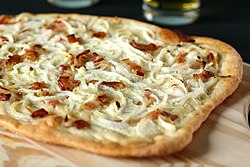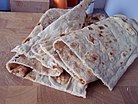Flammekueche
 | |
| Place of origin | Germany |
|---|---|
| Region or state | Alsace/Baden-Württemberg |
| Main ingredients | Bread dough, fromage frais or crème fraîche, onions, lardons |
| Variations | Au Munster, gratinée, forestière, sweet |

Tarte flambée is an Alsatian and South German dish composed of bread dough rolled out very thinly in the shape of a rectangle (traditionally) or circle, which is covered with fromage blanc or crème fraîche, thinly sliced onions and lardons. It is one of the most famous specialties of the region.[1]
Depending on the region, this dish can be called Flammekueche, Flàmmeküeche[2] Flàmmaküacha[3] or Flammekuechle in Alsatian, Flammkuchen in German, which means "flame cake", or in French tarte flambée, which translates as "pie baked in the flames." Contrary to what the direct translation would suggest (possibly not, because flambée means flamed, which includes the open flame of a wood-stove) tarte flambée is not usually flambéed, but cooked in a wood-fire oven. There are many variations of the original recipe, in terms of the garniture.[4] The standard variations are:
- Gratinée: with added gruyère cheese;
- Forestière: with added mushrooms;
- Munster: with added munster cheese;
- Sweet: dessert version with apples, cinnamon, and flambéed with Calvados or another sweet liqueur.
Origin
Legend says that the creators of this dish were Alemannic-German-speaking farmers from Alsace, Baden or the Palatinate who used to bake bread once a week or every other week. In fact, the tarte flambée was originally a homemade dish which did not make its urban debut until the "pizza craze" of the 1960s. A tarte flambée would be used to test the heat of their wood-fired ovens. At the peak of its temperature, the oven would also have the ideal conditions in which to bake a tarte flambée. The embers would be pushed aside to make room for the tarte in the middle of the oven, and the intense heat would be able to bake it in 1 or 2 minutes. The crust that forms the border of the tarte flambée would be nearly burned by the flames.[5] The result resembles a thin pizza.
See also
References
- ^ Villegas, Maria (2005). "Tarte flambée". The food of France: a journey for food lovers. Murdoch Books. p. 56. ISBN 978-1-74045-471-1. Retrieved 26 February 2010.
- ^ http://www.olcalsace.org/sites/default/files/lexique_courses.pdf
- ^ http://culture.alsace.pagesperso-orange.fr/page_f.htm
- ^ Helga Rosemann, Flammkuchen: Ein Streifzug durch das Land der Flammkuchen mit vielen Rezepten und Anregungen [Flammkuchen: A foray into the land of the tartes flambées with many recipes and suggestions] (Offenbach: Höma-Verlag, 2009).
- ^ Rosemann 4-5.

